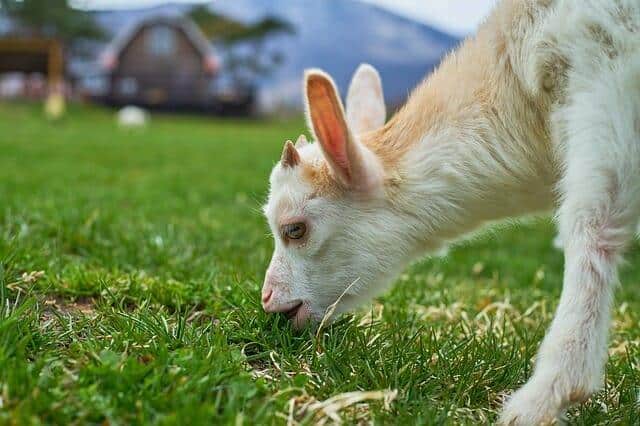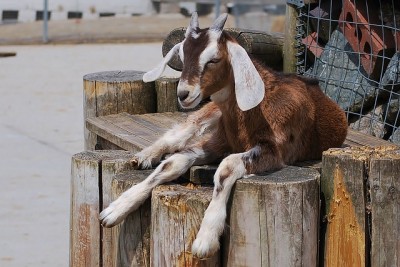Despite the fact that goats have a reputation of being able to digest anything, there are plenty of plants that are potentially toxic to them, and savvy goat owners do well to stay informed about possible poisons that might be available to their animals.
To that end, there are a plethora of lists, both online and in print, of both wild and cultivated plants which are said to pose a threat to the health of goats and other livestock. Like many people, I have developed a collection of trusted and favorite go-to resources over the years. Instead of providing another list here which would risk being repetitive and incomplete, I would like to offer something more valuable — a common-sense guideline for using the information already available to keep your goats safe from toxic plants.
How to Find Resources
An online search for “plants toxic to goats” yields thousands of results. The sources run the gamut from trustworthy to questionable, and include professional information from veterinarians and large established breeders as well as blogs written by amateurs who may or may not have a good grip on the facts. Sometimes the sources agree with one another, and other times they do not.
It can be tough to choose which to believe. I tend to favor sites which are sponsored by real authorities — based on their education, background and experience — and that appear to generally agree with other sites. Originality is great as a concept, but if I find one site which insists a certain plant is perfectly safe while most other credible sources warn against it, I am probably going to be a bit wary of the nonconformist. If the outlier offers a reason — based on verifiable evidence — for going against conventional wisdom, I’ll consider it.
Diatomaceous Earth: The All-Natural Livestock De-Wormer!
Other informational sources include books and magazine articles. These, too, require the reader to be judicious. As with online sources, I steer toward publications that are known for expert advice and fact-checking instead of personal stories of one person’s experience. The latter are often interesting and useful, but not always reliable.
Cooperative extensions, colleges and universities, and other public agricultural vocational programs usually provide solid advice. My state has a state veterinarian’s office which is open to calls and requests for help from the public, and I would not be surprised if many states offer similar availability.
Another excellent option is a goat network. These range from nationwide to local, meet through social media or around a neighbor’s kitchen table, and usually offer a wealth of experience and knowledge. There are official organizations for dairy goats, meat goats, miniature goats, and for virtually every specific breed of goat, as well as regional groups to support goat husbandry for people of all ages. It is highly advisable to build and maintain a rapport with people you know and trust to answer all kinds of questions about goats, including possible toxic plants.
Last but by no means least, a working relationship with a reliable veterinarian or clinic is ideal. It can be challenging to find professional health care for goats in some regions, but it is worth the effort to do so.
Consider Geography and Perspective
I found a lot of dire warnings online against goats eating pine trees. Some sites broadened the warning to include other softwood species.
My own goats had access to a veritable smorgasbord of softwood trees, and seemed to enjoy them with no ill effects, but the literature caused me to be concerned about continuing to include it in their diets.
My veterinarian cleared up the confusion. He told me that pine trees native to much of North America are indeed dangerous to goats, but not the Eastern White Pines we have in this area. It turns out that variations among species due to geography can make a big difference.
Regarding perspective, some people refer to all softwood trees as “pine,” perhaps due to regional colloquialisms or being unfamiliar with trees. To me, “all softwoods” includes fir, spruce, cedar, hemlock and more — all as different from one another as dandelions from daffodils. To other people, “all softwoods” means “all red pines.”
Some sites warned against the tannin in tree bark, so I asked my veterinarian about that, too. He confirmed that excess consumption can indeed build up to toxic levels, but that the goats could safely consume bark as long as they drank plenty of water. This information turned out to be similar to the general warnings against softwood trees, in that it was true, untrue and partially true.
Take Individual Goats and Situation Into Account
Wild cherry trees are generally accepted to be toxic to goats. These trees grow in abundance on my homestead, and I have always taken care to keep them away from my animals. However, because saplings sprout persistently on the many cherry tree stumps inside my large goat pen, it is hard to keep up with. As diligent as I try to be, I know they eat it. I’ve caught them in the act, and found evidence of saplings having been browsed.
But just as I was considering relaxing my vigil — thinking perhaps that my local cherry trees are not the toxic type — a neighbor’s goat browsed a cherry tree and died within hours.
I do not know why my goats have survived cherry tree consumption. My guess is that it is because they have access to so much varied vegetation that the cherry toxins are sufficiently diluted.
To be clear, I absolutely do not recommend offering a poisonous plant to goats. But remember that every situation is different. And in the same way that a plant said to be highly dangerous can turn out to be tolerable, the reverse is also possible. The message here is to use common sense, and if goats present symptoms after consuming a plant — even if the experts say it is not toxic – then observe them closely and be ready to spring into action if necessary.
Choices Must Be Made
Milkweed is included on most lists of plants toxic to goats, so I pull it whenever I see it. It makes me sad to do so, being cognizant of the fact that milkweed is essential to the survival of monarch butterflies. But I must prioritize the health of my goats, and hope that enough of my goat-less neighbors will allow their milkweed to thrive to support the monarchs.
Similarly, I avoid the lovely lupine flowers that are quintessential to my area. I settle for admiring them beside the road on other properties, and keep them away from mine.
As with most things, there are pros and cons to plants toxic to goats, forcing owners to make tough choices. But having goats means keeping them safe, and for me that must come first.
Are Old Wives’ Tales True?
Everyone has a story about goats. But some are anomalies. People often insist that goats instinctively reject poisonous plants. I would not trust my goats’ health to that notion, but every owner makes his or her own decisions for goats in their care.
Another story I heard was about goats and poison ivy. It is said by some that when milking goats eat poison ivy, they pass on immunities to it through their milk. Being highly allergic, I very much wanted that to be true on my farm, but it was not. Goats can safely consume poison ivy themselves, but people who drink their milk afterwards do not then acquire the immunity. Or at least I didn’t.
By researching sources and relying upon those which appear the soundest, keeping in mind that regional differences can change the equation, acknowledging that individual cases may be unique, and remembering that not everything said about goats is true, it is possible to make good choices and protect goats from toxic plants.
Do you have goats? What types of plants do you keep your goats from? Share your tips in the section below:
 Off The Grid News Better Ideas For Off The Grid Living
Off The Grid News Better Ideas For Off The Grid Living





